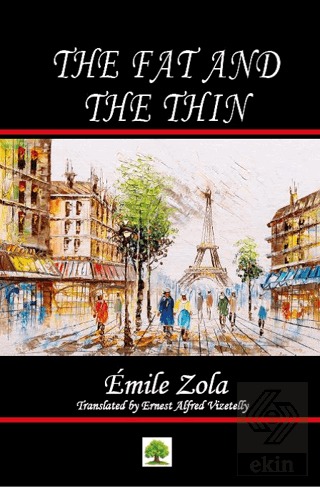
"THE FAT AND THE THIN," or, to use the French title, "Le Ventre de Paris," is a story of life in and around those vast Central Markets which form a distinctive feature of modern Paris. Even the reader who has never crossed the Channel must have heard of the Parisian Halles, for much has been written about them, not only in English books on the French metropolis, but also in English newspapers, magazines, and reviews; so that few, I fancy, will commence the perusal of the present volume without having, at all events, some knowledge of its subject matter. The Paris markets form such a world of their own, and teem at certain hours of the day and night with such exuberance of life, that it was only natural they should attract the attention of a novelist like M. Zola, who, to use his own words, delights "in any subject in which vast masses of people can be shown in motion." Mr. Sherard tells us[*] that the idea of "Le Ventre de Paris" first occurred to M. Zola in 1872, when he used continually to take his friend Paul Alexis for a ramble through the Halles. I have in my possession, however, an article written by M. Zola some five or six years before that time, and in this one can already detect the germ of the present work; just as the motif of another of M. Zola's novels, "La Joie de Vivre," can be traced to a short story written for a Russian review.
"THE FAT AND THE THIN," or, to use the French title, "Le Ventre de Paris," is a story of life in and around those vast Central Markets which form a distinctive feature of modern Paris. Even the reader who has never crossed the Channel must have heard of the Parisian Halles, for much has been written about them, not only in English books on the French metropolis, but also in English newspapers, magazines, and reviews; so that few, I fancy, will commence the perusal of the present volume without having, at all events, some knowledge of its subject matter. The Paris markets form such a world of their own, and teem at certain hours of the day and night with such exuberance of life, that it was only natural they should attract the attention of a novelist like M. Zola, who, to use his own words, delights "in any subject in which vast masses of people can be shown in motion." Mr. Sherard tells us[*] that the idea of "Le Ventre de Paris" first occurred to M. Zola in 1872, when he used continually to take his friend Paul Alexis for a ramble through the Halles. I have in my possession, however, an article written by M. Zola some five or six years before that time, and in this one can already detect the germ of the present work; just as the motif of another of M. Zola's novels, "La Joie de Vivre," can be traced to a short story written for a Russian review.
| Taksit Sayısı | Taksit tutarı | Genel Toplam |
|---|---|---|
| Tek Çekim | 414,72 | 414,72 |
| 2 | 215,65 | 431,31 |
| 3 | 149,30 | 447,90 |
| Taksit Sayısı | Taksit tutarı | Genel Toplam |
|---|---|---|
| Tek Çekim | 414,72 | 414,72 |
| 2 | 215,65 | 431,31 |
| 3 | 149,30 | 447,90 |
| Taksit Sayısı | Taksit tutarı | Genel Toplam |
|---|---|---|
| Tek Çekim | 414,72 | 414,72 |
| 2 | 215,65 | 431,31 |
| 3 | 149,30 | 447,90 |


















